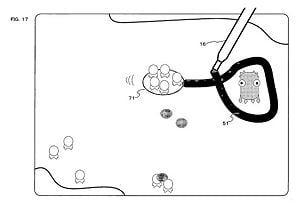Patent US7762893: Difference between revisions
(Updated references.) |
No edit summary |
||
| Line 3: | Line 3: | ||
{{stub}} | {{stub}} | ||
{{image|http://www.google.com.ar/patents/US7762893}} | {{image|http://www.google.com.ar/patents/US7762893}} | ||
"'''US7762893'''" (also published as EP1716897A2, EP1716897A3, US20060252531) was a design concept for a touch-based strategy game highly resembling the ''[[Pikmin series|Pikmin]]'' series on a device that bears a remarkable resemblance to the [[nwiki:Nintendo DS|Nintendo DS]].{{cite web|http://kyoto-report.blogspot.co.uk/2011/05/release-dates.html|Prototype Database|The Kyoto Report{{dead link | "'''US7762893'''" (also published as EP1716897A2, EP1716897A3, US20060252531) was a design concept for a touch-based strategy game highly resembling the ''[[Pikmin series|Pikmin]]'' series on a device that bears a remarkable resemblance to the [[nwiki:Nintendo DS|Nintendo DS]].{{cite web|http://kyoto-report.blogspot.co.uk/2011/05/release-dates.html|Prototype Database|The Kyoto Report{{dead link|November|2015}}}} It was filed as a patent in January 2006 by Yuji Kando and Yutaka Hirameki{{cite web|http://patft.uspto.gov/netacgi/nph-Parser?Sect2{{=}}PTO1&Sect2{{=}}HITOFF&p{{=}}1&u{{=}}/netahtml/PTO/search-bool.html&r{{=}}1&f{{=}}G&l{{=}}50&d{{=}}PALL&RefSrch{{=}}yes&Query{{=}}PN/7762893|United States Patent: 7762893|United States Patent and Trademark Office}}, who respectively are the main programmers and level designers for ''[[Pikmin (game)|Pikmin]]'' and ''[[Pikmin 2]]''. | ||
According to the patent, gameplay would involve players controlling [[Pikmin family|Pikmin]]-like characters with a "pointing device", with the objective being to guide these units to other objects so that they can interact in certain ways.{{cite web|http://uk.gamespot.com/features/patented-game-mechanics-that-might-surprise-you-6369027/?page{{=}}11|Patented Game Mechanics That Might Surprise You, Page 11|GameSpot{{dead link | According to the patent, gameplay would involve players controlling [[Pikmin family|Pikmin]]-like characters with a "pointing device", with the objective being to guide these units to other objects so that they can interact in certain ways.{{cite web|http://uk.gamespot.com/features/patented-game-mechanics-that-might-surprise-you-6369027/?page{{=}}11|Patented Game Mechanics That Might Surprise You, Page 11|GameSpot{{dead link|November|2015}}}} | ||
==See also== | ==See also== | ||
Revision as of 09:54, November 12, 2015
|
This article is a stub. You can help Pikipedia by expanding it. |
|
This article or section is in need of more images. Particularly: |
"US7762893" (also published as EP1716897A2, EP1716897A3, US20060252531) was a design concept for a touch-based strategy game highly resembling the Pikmin series on a device that bears a remarkable resemblance to the Nintendo DS.[1] It was filed as a patent in January 2006 by Yuji Kando and Yutaka Hirameki[2], who respectively are the main programmers and level designers for Pikmin and Pikmin 2.
According to the patent, gameplay would involve players controlling Pikmin-like characters with a "pointing device", with the objective being to guide these units to other objects so that they can interact in certain ways.[3]
See also
References
- ^ Prototype Database on The Kyoto Report[dead link]
- ^ United States Patent: 7762893 on United States Patent and Trademark Office
- ^ Patented Game Mechanics That Might Surprise You, Page 11 on GameSpot[dead link]
External links
| Prerelease information | |
|---|---|
| General info | Pikmin • Pikmin 2 • Pikmin 3 • Pikmin 4 • Hey! Pikmin |
| Unused content | Pikmin • Pikmin 2 • Pikmin 3 • Pikmin 4 • Hey! Pikmin |
| Unreleased games | Adam and Eve • Patent US7762893 • Stage Debut |
